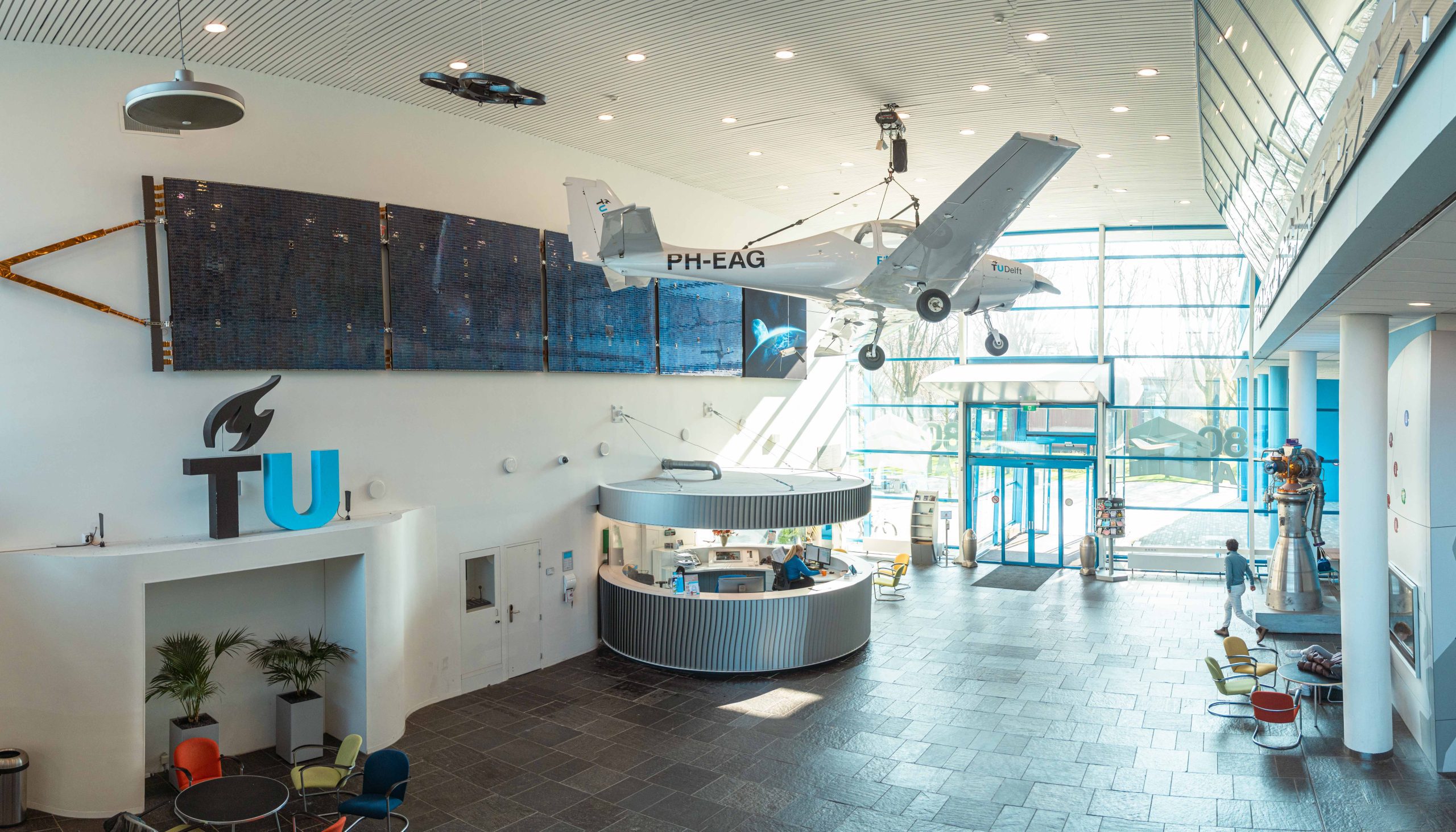Withdraw from the Future-proof Aviation for the Netherlands manifesto. This call is made by TU Delft alumnus Boris Schellekens in a petition to TU Delft, the University of Twente, and TU Eindhoven. He believes that they are ‘letting themselves be taken advantage of by the aviation lobby’. TU Delft views this differently. “This manifesto is a compromise. And we need it as nothing will happen otherwise.”
The hall of the Aerospace Engineering Faculty. (Photo: Thijs van Reeuwijk)
In an open letter (in Dutch) to TU Delft, Schellekens, a Faculty of Aerospace Engineering alumnus, wrote that he was surprised to see the TU Delft, University of Twente and TU Eindhoven logos below the aviation industry’s Future-proof Aviation for the Netherlands manifesto. This is an aviation sector lobby that hopes to exert influence on a new Dutch Coalition Agreement.
Naivety
Schiphol did not sign the manifesto because, as the Netherlands Aerospace Centre (NLR) says, it did not go far enough in terms of CO2 reduction. The outgoing Minister of Infrastructure, Marc Harbers, is also not entirely in agreement (in Dutch). He does not support the argument for a worldwide policy for the sector as it would mean that it would take a long time before any measures are taken.
‘If you do not read the manifesto carefully, it looks as though it makes a lot of good points’
The three technical universities did sign it. Schellekens does not understand this at all. ‘You have let yourself be taken advantage of by the aviation lobby’, he writes. On the telephone, he speaks about naivety. “If you do not read the manifesto carefully, it looks as though it makes a lot of good points.”
He is particularly critical about three points:
- The manifesto asserts that national policies would push passengers and the aviation industry across borders, which will not have a positive effect on the climate. Schellekens points to independent administrative studies (in Dutch) and to an investigation by CE Delft (in Dutch) that show that there will be CO2 savings.
- Further, the sector is setting a CO2 emission reduction to 2005 levels. This would involve a 9% reduction compared to 2019. The NLR calculated that this would actually have to be 30% if the Netherlands is to meet the Paris climate goals.
- The manifesto also rejects the closing of Schiphol at night on the grounds that this would be bad for the Netherlands. In a study, CE Delft calculated (in Dutch) that Schiphol, under pressure from KLM, tried to keep it quiet that a drop in the number of night flights would actually benefit living standards.
Schellekens’ petition has been in circulation on LinkedIn since 14 March. On that same platform, TU Delft’s Sustainability Coordinator, Andy van den Dobbelsteen, showed surprised that TU Delft signed the aviation manifesto. He told Delta that he has drafted a memo for the Executive Board containing questions and advice.
‘We want aviation to be better and more sustainable, but we cannot do this alone’
Schellekens spoke to Dean Henri Werij of the Faculty of Aerospace Engineering who signed the manifesto on behalf of TU Delft. He hopes that Werij will change his mind by Tuesday 19 March. If not, he will submit his letter with the signatures to the Executive Board.
Influence
Werij stated that he is not intending to withdraw his signature, as this would also take away his influence. “Personally, I agree with Boris that people should fly less and that we should have a national policy as I am hugely concerned about what is happening in the world. And this is why we are trying to exert some influence. KLM, for example, thinks very differently than we do. The manifesto is a compromise between all the parties involved. We need to continue talking to each other. If not, nothing will happen.”
How does Werij view the research that Schellekens has brought up? Werij says that the manifesto should not be viewed as a scientific publication, but as a plan with good and less good aspects. He admits that in terms of CO2 reduction, it does not go far enough. But he also sees that it contains ‘major challenges’ such as the intention to mix 14% sustainable fuel in the kerosene. As an aside, the mixing of this percentage from 2030 onwards was already included in the Luchtvaartnota 2020-2050 (aviation policy document, in Dutch).
“As a faculty, we want to help make aviation better and more sustainable, but we will not achieve this alone,” says Werij. “In his ministerial position, Marc Habers has surprised me. But I fear that a new Cabinet with parties that think climate is nonsense will take a different view. So it is good if we can exert some influence on a Government agreement.”
Do you have a question or comment about this article?
s.m.bonger@tudelft.nl


Comments are closed.